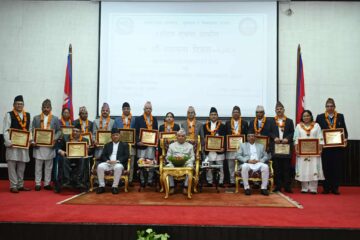Dr. Anjhula Mya Singh Bais
Having an understanding of Covid-19’s RNA nucleotide sequences, logistic chains and the efficacy of face masks versus hand sanitisers isn’t particularly effective if we don’t understand emotional epidemiology. In the New England Journal of Medicine, Dr Danielle Ofri forewarns clinicians to be on the look-out for attitudinal change, being aware of the initial panic and then complacency of their patients. Across the globe, psychology and behavioural analysis has been utilised more as an after-thought rather than a preventative or integrated strategy in Covid-19 containment efforts.
Where the practice and study of psychology is severely underdeveloped and unregulated in countries like Malaysia, India, and Sri Lanka, we see deeply problematic actions borne through the intersectionality of culture, religion, and politics. This gives way to behaviours that psychologists could very likely map and should be included alongside medically driven models. In pursuit of the right to religious freedom in India and Malaysia, potentially thousands of people could be and have been infected with the virus, severely challenging those populations’ fundamental human right to life. The intensity of the insistence of attending a religious festival at a Mosque outside of Kuala Lumpur despite warnings came as a surprise to many and is the cause of two thirds of the Covid-19 cases in Malaysia, lagging behind only China and South Korea in Asia. My research on global health and behaviour in South and Southeast Asia demonstrated how Malaysia is increasingly becoming more religiously fundamentalist and that a religious disregard for a virus was not only likely but to be assumed in any simulation.
In symbiotic relationships, governments worldwide are failing their citizens and in turn, citizens are failing government orders, themselves, and each other. This is in part the result of psychological distortions which if understood and acted upon expediently, can prevent the grief and trauma currently battering the world. Two such distortions applied to the climate crisis and equally applicable to Covid-19 are what Dr Robert Gifford calls the Dragon of Uncertainty and the Dragon of Environmental numbness. Through limited cognition we see a subconsciously uncertain US President Donald Trump acting through inaction. His strong tendency towards self-interest was manifested in the assumption that there are enough hospital beds, protective uniforms, masks, and other equipment to handle a full blown epidemic or through what psychologists call magical thinking, they will, well, just appear. Meanwhile, when Covid-19 hit, Malaysian residents had barely digested what is widely touted as a backdoor coup and illegitimate change of government in early March on top of a country still reeling economically and psychologically from the disappearance of flight MH 370 and corruption scandal 1MDB.
In symbiotic relationships, governments worldwide are failing their citizens and in turn, citizens are failing government orders, themselves, and each other.
In theory, this meant while #NotMyPM was trending on Twitter in Malaysia, there was psychological contagion focused on feelings, such as injustice and helplessness, rather than thoughts. A psychological analysis of the Malaysian course of politics yields itself to the idea that emotions are more rational than we think. If an individual’s whose first speech as Prime Minister implores the nation to “Give me a chance”, they are likely to be risk averse because of their desire to solidify a precarious position. As a result, they are extremely unlikely to clash with Malaysian royalty who are considered keepers of Islam and have far reaching constitutional powers. Prime Minister Muhyiddin lacked the political will to enforce mosques and temples to shut down, whereas had he created a behavioural insights team as did former UK Prime Minister David Cameron, his advisory would posit that more upsetting to the voter bank is deep economic recession and the loss of thousands of lives, not the cancellation of mosque and temple festivities.
Throughout the world there is a palpable numbness of citizens who suffer from mistrust and fear of leaders in power, of compliance fatigue, and a weariness of fake news inserted in echo chambers. The importance of psychological messaging and the question behaviour effect helps set a trajectory that becomes either one that devastates or one that delivers. As countries focused on those who were not complying with movement orders and social distancing, I focused with therapy on all the people who were utilising the psychological principles of positive peer pressure and the power of belonging which results in prosocial behaviour.
In the times that governments and states do employ psychology, it is less science and more strategic, and is often used in nefarious ways. In the guise of science but led actually by economic scarcity, messages like “testing is not required” often means “we do not have testing kits.” “Masks are not effective” can mean “We do not have enough for health care workers.” In a newly formed Malaysian cabinet that comprises of only 11% women, the new deputy minister for women and family development Siti Zailah Mohd Yusoff’s preoccupation with a Sharia law compliant wardrobe for female flight attendants helped divert attention from Covid-19 resulting in exasperated people thinking it’s business as usual. This was exemplified by schools delaying shut down, young people going to the highlands for holiday and reputable stores reminding one that their birthday voucher hasn’t been redeemed, blithely carrying on as if a pandemic did not exist. Complimenting this diversion tactic was a disarmament tactic by Health Minister Datuk Seri Adham Baba, stating that by drinking warm water, the virus is flushed down to the stomach “and the virus will lose.”
…messages like “testing is not required” often means “we do not have testing kits.” “Masks are not effective” can mean “We do not have enough for health care workers.”
At each turn, Malaysia and other countries had an opportunity to learn from behavioural science in order to avoid Italy’s trajectory. Cryptic messaging from the Malaysian PM’s office saying wait for an important message sent hordes of people to panic buy eschewing social distancing and assuming the worst. The UK spoke about how many were buying survival supplies which causes a spike in people buying, not a reprieve. In return, Covid-19 has harshly highlighted the intersections of many identities, namely: social distancing is a privilege as it implies you have room and a roof to socially distance yourself from another, as is access to water for hand sanitation. The harrowing burden of the lack of accessibility, affordability, and unpaid care labour during the pandemic falls unequally onto the shoulders of the differently able, daily wage earners, women, and LGBTQIA as increasing depression and anxiety manifolds.
Seeded deep within the hearts of institutions, movements, statutory bodies, and finally human beings is a fundamental need to be liked, accepted and met with approval. Governments weighed the pros and cons of acting too fast against too slow, both which are economically costly. Many states have not dealt with a plethora of moves like quarantine, lockdowns, and the scale of the Covid-19 pandemic since World War II. The optimism bias fallacy and overestimation of resources was in full force as states displayed a fawn and freeze response to Covid-19 finally reaching their borders and shores.
Countries like Lebanon and Singapore have integrated psychology into their culture and society recognising that changing mindsets is not an off/on switch to employ with a telephone hotline during emergency. Instead, it is the daily interactions and emphasis that lays the groundwork towards improved behaviour in times of distress. Development of key messages, mental health advocacy and acceptance, and self-care in the public combined with increased psychology curriculum and stringent qualification standards for specialists fosters delayed gratification, a crucial component of a disciplined mindset and the very opposite of the “anything goes” mindset observed in India, Malaysia, and the US. This mindset is necessary to alleviate the fallout of pandemics, natural disasters, and war as exemplified by the Covid-19 response in China and South Korea’s population.
The Covid-19 intermission is a rare window for every state to make its inner mission one of refusing any longer to normalise the abnormal which has led to systemic ennui and blindness. Covid-19 will leave a wake of increased suicide, crippled health infrastructure, increased divorces, domestic violence, child abuse, and exacerbated mental health conditions. These are daily issues that psychologists face calmly with deep understanding under intense pressure. People deserve better. The policies and politics of each state ought to be altered from the current perception of mental health as something that comes later and instead catapulted to the top. Their responses going forward should embed psychological principles and behavioural science through crisis management and precautionary behaviour. Lastly, they must deeply self-reflect and realise that the reduction of psychological distress is upholding a fundamental human right to health, one that the World Health Organisation defines as “a state of complete physical, mental and social well-being and not merely the absence of disease or infirmity.”
The views and opinions expressed in this blog are those of the author and do not necessarily reflect the official policy or position of any other agency, organization, employer or company.







